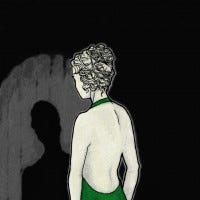Analysis: Story In Misfortune
Gamasutra contributor Emily Short examines Loadingames' browser-based single-player RPG Misfortune, appreciating the game's structure and art but picking apart the many flaws in its writing and tone.

[Gamasutra contributor Emily Short examines Loadingames' browser-based single-player RPG Misfortune, appreciating the game's structure and art but picking apart the many flaws in its writing and tone.] Disclaimer: Misfortune is a browser-based RPG of sorts with limited action turns per day. It falls into the same general market as Echo Bazaar, for which I have done some writing work. I received some free mission credits in order to enable me to write this column. Remember Wizardry? Long hallways, wandering monsters, the occasional trap or treasure. Spells with names like cocktails: the Mahalito, the Dalto. Misfortune takes you back there. The player has "mission credits," which refresh over time. It costs one mission credit to accept a quest at the local pub. Accepting a quest sends you off into an algorithmically generated, square-cornered map of passageways, gates, and secret doors which bears a strong resemblance to old Wizardry maps, though the images are now in color and significantly larger. Your task is to wander this space, knocking over barrels and searching rubbish piles looking for keys and loot-drops, and doing battle with the occasional wandering dog or ruffian who comes your way. Fighting isn't a tactical, turn-based challenge but rather a matter of clicking on your opponent, and this is not inherently all that fun. In the higher levels of gameplay, fighting is more about self-healing than anything else -- you need to be healing yourself constantly during a fight and timing the heals to occur when they can do the most good. It's easy to be overwhelmed by attackers from behind or coming from one side, and to die before you have the chance to land a single blow. Story elements occur through encounter dialogue boxes as the player travels the map. There are early hints of out-of-control automatons, a repressive royal regime, and possibly some sort of secret resistance at work. Certain story events give the player loot; others set qualities which advance gradually (In the course of playing, I had several encounters with an unfortunate man trying to court a woman named Shmolinda, for instance). A few special missions are unlocked by story progress, as well, so if you've spent enough time with your aunt, she may send you on a custom courier job, for instance. This provides a sense of forward movement and developing mystery, though it's not always one that the player has much control over. Still, some events hint that you have the opportunity to choose sides (e.g., helping some soldiers catch the revolutionary they're pursuing, or helping that revolutionary get away). If you fail a mission by dying in that map, you don't get to retain any of the progress you made, so it's possible to encounter the same story elements several times if you've got a high death rate before one finally sticks; but this doesn't feel much different from having to replay a level with story content in any other game. The art is a strength. Misfortune's storybook imagery is distinctive and yet not overly childlike. So far, Misfortune does a reasonable job of addressing the problem that every long-playing game struggles with: content generation. Wandering those virtual passageways is not, shall we say, an intensely compelling experience, but it's more diverse, continuous, and entertaining than the makework of the average Facebook game. Each mission takes only a few minutes to complete, guaranteeing the player a work break without committing him to a lot of effort. And while the typical mission map is made up of the same artwork and challenges you've seen many times before, there are occasional unusual landmarks that appear, such as a statue or a strange bit of wall. The story accumulates slowly, and story elements require relatively little unique art. What doesn't work so well is, I fear, the writing, both at the macro and the micro levels. To start with style: Misfortune's writing is usually whimsical without often being genuinely funny. It's tonally inconsistent. Dialogue is often inconsequential and rambles too long, offering several unimportant and uninteresting choices where it would have been better to offer one. It needs someone willing to edit, and edit aggressively: text in games -- even in primarily text games -- almost always benefits from being trimmed hard. Every piece needs to be doing something: communicating character or setting, telling a joke, explaining gameplay. Misfortune's text often has the first draft quality of text written while the author was still figuring out what this piece of the story was supposed to do. The occasional typos and missing punctuation don't help, and neither does the hard-to-read typography. To the extent that the text is essentially the reward in this game, it needs to be given more respect. Then there's the question of what kind of story Misfortune means to tell. The various snippets don't even seem to agree on what kind of character you control or what kind of story is being told. In some passages, the protagonist comes off as a young adolescent, being scolded by a nagging auntie who is barely willing to let him go off on his own, and the picture makes him look like a boy rather than a teenager. At other times, he offers worldly advice about dating and ogles the local barmaid in a fashion that's implicitly adult. The world building is similarly patchy. Misfortune bills itself as steampunk, but this doesn't mean lavish Victorian settings. Occasionally you're attacked by what looks like an angry gear-driven mailbox, and it's possible to collect components such as pipes and cogs to build bigger and better weapons (though in the course of the 60-odd missions I played, I never got close to having enough money and goods to create one of these). But the rest of steampunkery is absent. Other aspects of the world hint at pirates, a king, a bard-like character -- elements culled from various eras. It's certainly possible to build an interesting world around apparently anachronistic elements, but the problem is that there's no obvious coherence to the choices here. Tone is also odd. The maps read as grim and melancholy, especially as the most interactive characters inhabiting them are the characters who want to kill you, but the story doesn't take itself at all seriously: for instance, the tavern where you get most of your missions features a "piano man" at one point, with a straight rip of Billy Joel lyrics. Why? It's not terribly funny, but it is completely off for the setting and propels the player right out of the story. It's not just unevocative, it's anti-evocative. Even goofy old Wizardry knew how to take itself exactly seriously enough -- and those spell names were rigorously systematic if you paid attention. What Misfortune needs is a specific vision for the textual content and the discipline to execute it. Overall, then, I think the structure of Misfortune has a certain amount of promise. It gives the player small, bite-sized bits of gameplay in a format that is probably not too grueling to produce, and the mechanics are there to support a developing story arc. But the mission gameplay would be stronger if combat were less frustrating and if it were possible to use player inventory in more interesting ways. (There are, for instance, pieces of clothing that will enhance your various stats, but since you never know when a Speech or Dexterity roll is going to come up, you have no opportunity to swap items out for tactical advantage.) The missions aren't exactly novel, but they work. Then it needs some tighter story content. [Emily Short is an interactive fiction author and part of the team behind Inform 7, a language for IF creation. She also maintains a blog on interactive fiction and related topics. She also contracts for story and design work with game developers from time to time, and will disclose conflicts with story subjects if any exist. She can be reached at emshort AT mindspring DOT com.]
About the Author(s)
You May Also Like







.jpeg?width=700&auto=webp&quality=80&disable=upscale)








